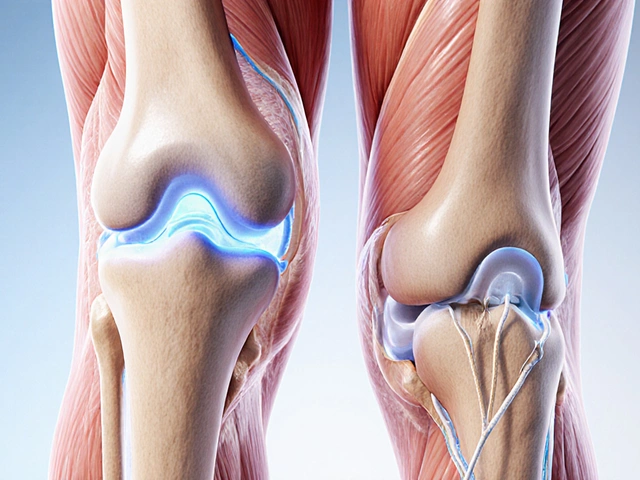- Home
- Orthopedics
- How Bad Does a Knee Have to Be Before It Is Replaced?

How Bad Does a Knee Have to Be Before It Is Replaced?
You might wake up most mornings with a creaky, stiff knee and wonder, “Is it time for a new knee, or am I just getting older?” Here’s the thing—everybody’s knee tells a different story, and the line for when it’s ‘bad enough’ for replacement isn’t a one-size-fits-all answer. Knees can power through a lot of abuse, but when pain and swelling start taking over your daily routine, it gets personal fast.
Doctors aren’t just looking at X-rays or MRI scans and checking boxes. They want to know if you’re struggling to get up out of a chair, can’t manage stairs, or find yourself skipping stuff you love—like chasing your kids around or even walking through the grocery store. That’s the real turning point for a lot of people. If you notice your knee pain isn’t just sticking around, but actually getting worse over months, or painkillers and exercises are barely touching it, those are the moments to stop and take stock.
- How Bad Is Your Knee, Really?
- What Doctors Look For: Signs and Tests
- Life Impact: Daily Limits and Limitations
- Tips to Delay (or Prepare For) Replacement
How Bad Is Your Knee, Really?
Knee pain comes in a bunch of flavors—sometimes it’s a low, nagging ache, other times it feels like your whole joint is on fire. Not every bit of pain or soreness means you need a knee replacement. It’s about how much the pain steals from your daily life. Constant swelling, nighttime pain that wakes you up, or needing help to even stand up—these are red flags.
The biggest indicator is if pain or stiffness hangs around for more than six months despite trying rest, meds, and joint health treatments like physical therapy. So ask yourself: can you walk a few blocks or go up stairs without wincing? Has your knee stopped you from working, driving, or doing things you love? If the answer is yes, that’s a sign you’re moving into knee replacement territory.
Doctors use a few dead-simple questions to zero in on how bad things are:
- Do you feel soreness most days, not just after a long day?
- Has pain made you cut down on activities you care about?
- Do you need pain meds just to get through the day?
- Does your knee “catch,” give way, or even lock up?
Here’s a look at the kind of practical limitations that often push people toward knee replacement:
| Daily Activity | With Healthy Knee | With Bad Knee |
|---|---|---|
| Walking (500 meters) | No pain | Stiffness, soreness, stops often |
| Stairs | Normal pace | Uses railing, one step at a time |
| Sleeping | Full night’s rest | Pain wakes you up, hard to get comfortable |
| Getting up from chairs | No struggle | Needs arms/chair for support |
Basically, if your day-to-day life shrinks because your knee just can’t keep up—and not even painkillers or lifestyle changes help—it’s time to get your knee pain checked out for real.
What Doctors Look For: Signs and Tests
When it comes to knee replacement decisions, doctors go way beyond a quick glance at your leg or asking how much it hurts. First up, they’ll look for signals that your knee just isn’t holding up anymore. Constant pain, swelling that won’t go away, and that grinding, bone-on-bone feeling—these are all big red flags. If you’re relying on pain meds more and more, that’s another hint things are getting serious.
During an appointment, a doctor usually:
- Checks your knee’s range of motion (how far you can bend or straighten it).
- Measures swelling and notes if your knee is warm or tender.
- Observes how you walk—limping or favoring one side can mean joint damage.
- Asks if everyday stuff like climbing stairs, getting out of cars, or even sleeping is tough due to pain.
X-rays are a must for checking how much cartilage is left. If it’s gone and the bones are rubbing together, that’s a key sign the joint’s worn out. Sometimes, you’ll get an MRI if there’s a question about soft tissue damage, but honestly, X-rays tell most of the story when planning knee replacement surgery.
Doctors want to see exactly how your pain affects daily life, so they might give you a short questionnaire about your ability to move around and do normal activities. Some clinics use a pain scale—if you’re rating your knee pain at 7 or higher almost every day, that makes them pay closer attention.
| Sign or Test | Why It Matters |
|---|---|
| Severe pain not relieved by meds | Signals joint damage and failing conservative treatments |
| Loss of knee movement | Affects walking and basic tasks |
| Bone-on-bone seen on X-ray | Proves cartilage is gone, joint is failing |
| Daily activity limits | Shows life is impacted, can justify surgery |
Long story short: doctors look at physical exams, X-rays, and, most importantly, what your knee is stopping you from doing. If your pain, stiffness, and loss of function line up with those clinical signs, you’re probably closer to needing a knee replacement than you think.

Life Impact: Daily Limits and Limitations
So, how does a bum knee get in the way of real life? Most people asking about knee replacement aren’t just dealing with a bit of soreness after a workout. It’s usually a cascade: sharp pain getting out of bed, knees that lock or buckle, maybe a limp you’ve developed to just get anywhere. Tasks that used to be no-brainers—simple stuff like shopping, getting in and out of a car, or even kneeling to tie your shoes—suddenly become big challenges.
A national patient survey from 2023 found that over 70% of folks considering knee replacement couldn’t walk more than a block before needing to rest. That’s barely making it through the parking lot. If things like mowing the lawn or playing with your grandkids are off-limits, you’re not alone. This sort of daily-life grind is what tips the scale for a lot of people. It’s not just pain—it’s how pain shrinks your world.
Doctors use a few common markers to talk about these limits:
- Waking up at night from knee pain
- No longer able to manage stairs unless there’s a railing
- Needing help with chores you once did solo
- Cutting back on hobbies or social stuff because it’s just too hard on your knees
- Pain that sticks around even when resting (not just after use)
If any of these ring true, your knee might be running the show now instead of you calling the shots.
"We tell our patients that if knee pain is keeping them from doing the things they need or love to do, and nothing else is helping, that’s when we start talking about knee replacement." — Dr. Sameer Bhargava, orthopedic surgeon, Max Healthcare, quoted in Times of India
Some folks try to tough it out for years—sometimes with a cocktail of pain pills, knee braces, or even steroid injections. But there’s a point when those just don’t cut it, especially as pain starts to leave you tired, cranky, or even a little depressed. When your daily limits stack up, it’s probably time for a reality check with your doctor about next steps.
| Common Tasks | % Who Struggle (Pre-Surgery) |
|---|---|
| Stairs | 82% |
| Kneeling | 77% |
| Standing 30 mins | 65% |
| Walking a block | 71% |
If these numbers hit home, it’s not just you. Sometimes drawing that line—when daily life keeps shrinking—means you deserve better solutions, even if that means a knee replacement.
Tips to Delay (or Prepare For) Replacement
If you’re hoping to put off that knee replacement a bit longer, you’re not out of options yet. Sometimes a few changes and smart habits really can buy you more good years out of your own joints.
- Stay active, but don’t overdo it: Gentle exercise keeps your knee moving and can help stop it from getting stiffer. Swimming and cycling? Both great. Skip high-impact stuff like running and jumping unless your doctor waves you on.
- Weight matters a ton: Even five kilos makes a difference. Every extra pound adds more load on your knee. One study showed your knee takes on up to four times your body weight with each step—so dropping just a little weight eases daily grind on the joint.
- Physical therapy isn’t just for athletes: Physio can teach you moves to strengthen muscles around the knee, which relieves pressure on worn-out cartilage. Most people feel more stable, and some actually get back to things they’d stopped doing.
- Pain relief hacks: Over-the-counter meds like acetaminophen or ibuprofen still have their place, especially on bad days. Ice packs and hot compresses? They sound old school, but they do work.
- Knee braces or shoe inserts: These help shift your weight off the sore spot. Sometimes just wearing the right shoes makes walking a whole lot easier.
But if the writing’s on the wall and your knee is calling the shots, prepping for surgery makes a bigger difference than you think. Here’s how to get ready:
- Sort your home: Move things so you’re not hiking up stairs ten times a day after surgery. That means setting up a bed or sitting area on the first floor if possible.
- Strengthen before surgery: Prehab is real. A few weeks with a physical therapist to build muscle can speed up your recovery.
- Plan for downtime: Ask someone to help with meals, chores, or even just rides to appointments. You’ll recover quicker if you’re not stressing over daily stuff.
| Method | Expected Impact |
|---|---|
| Weight Loss (5kg) | Reduces knee joint pressure by about 20kg per step |
| Physical Therapy | Improved stability and strength in 70% of patients |
| Knee Braces/Inserts | Less pain in day-to-day walking for most users |
Delaying knee replacement isn’t always possible, but throwing every trick you can at it gives you the best shot at controlling when it happens—and feeling more ready when it does.

Arnav Singh
I am a health expert with a focus on medicine-related topics in India. My work involves researching and writing articles that aim to inform and educate readers about health and wellness practices. I enjoy exploring the intersections of traditional and modern medicine and how they impact healthcare in the Indian context. Writing for various health magazines and platforms allows me to share my insights with a wider audience.
About
Medical Resource Center India is a comprehensive online platform dedicated to providing reliable health information and medical resources in India. Explore a wide range of articles, tips, and advice on medicine, healthcare services, and wellness. Stay informed about the latest developments in Indian medicine and access valuable insights into maintaining a healthy lifestyle. Discover expert guidance and health solutions tailored for every Indian citizen. Your go-to destination for authoritative medical knowledge in India.








